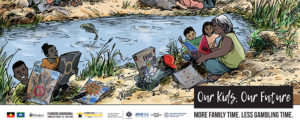From the Directors
We continue to grow our programs including The Flinders Program, world leading CBT training and supervision programs as well as Gambling Therapy Innovations.
NHMRC Grant Success!
“Improving cardiovascular health and quality of life in people with severe mental illness: a randomised trial of a ‘partners in health’ intervention.” ($960,000)
This 4 year randomised trial will test the use of the Flinders Program in people with psychosis. The Flinders team led by Professors, Malcolm Battersby & Sharon Lawn along with Chief Investigators, Professor Michael Kidd, Professor Julio Licinio, Professor Philip Aylward, Professor Amanda Baker, Professor Julie Ratcliffe & Dr Stephen Quinn will work with patients and staff in the Southern Adelaide Mental Health Service to use self -management principles and collaborative partnerships with patients to improve their physical health.
We continue to receive requests from around the globe from groups seeking to translate the Partners in Health Scale (PIH) for use in research and in practice. This has prompted us to consider how we further refine and streamline our permission and licencing processes for use of this popular standardised chronic condition self-management assessment tool.
Since our last newsletter, we have had the pleasure of hosting a delegation of mental health champions from West Java who have come to learn more about Australia’s mental health system and how they might build their community services. Sharon has also visited them in West Java to gain a firsthand sense of their needs. We’ve also hosted research collaborators from the Changchun Centre for Disease Control (CDC) in northern China. You can read more in the stories below.
Enjoy,
| Professor Sharon Lawn Director FHBHRU  |
Professor Malcolm Battersby Clinical Director Mental Health Southern Adelaide Local Health Network  |
$60,000 grant to help families cope with PTSD
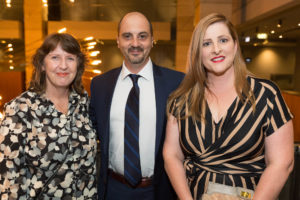
Helping families to support veterans and emergency services first responders who experience PTSD is the focus of a new research program, following a $60,000 grant from the Repat Foundation – The Road to Home.
‘The Repat Foundation – The Road Home’ research grants were established to promote and improve health and wellbeing for veterans, emergency services personnel and their families across Australia.
The Repat Foundation – The Road Home raises awareness and funds to support health and wellbeing research and projects into conditions like Post-Traumatic Stress for our nation’s veterans, emergency service personnel and their families. In partnership with The Hospital Research Foundation, The Road Home also coordinates a Wellbeing program for servicemen and women to support their transition from service and/or injury to the next stage of life through a peer support community and wellbeing activities.
This grant will assist research to discover how to best help families living with sufferers of post-traumatic stress syndrome. To undertake this research, FHBHRU research staff (including Dr Elaine Waddell) will be joined by Dr Louise Roberts from Flinders paramedics school and Dr Julie Henderson from Southgate Institute. We plan to interview partners to investigate what helps or hinders their ability to provide support to contemporary war veterans and emergency services first responders (ESFRs). We also want to determine what resources and programs are required to maintain the mental health of those supporting their partner with post-traumatic stress at home. The team is looking forward to commencing this important research and we will ensure to provide updates in our next newsletter.
Please email Professor Sharon Lawn for more information.
Connecting with China to fight chronic disease
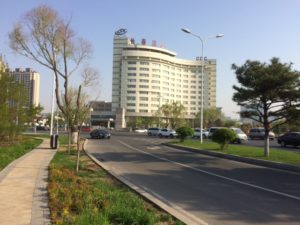
In May 2016, I was invited to spend three weeks at the Centre of Disease Control in Changchun China (the home of Pu Yi – the Last Emperor).
The CDC in Changchun is responsible for tracking and coordinating the monitoring of air, water, food, and infectious disease in Changchun. As the burden of chronic disease rises in China, the CDC has an increasing focus on also helping its community to address this as a significant public health issue.
I provided several presentations and ran workshops on how Chronic Condition Management is managed in Australia. I also carried out site visits to primary care services, Changchun’s large mental health hospital and visited research staff at Jilin University. I was inspired by witnessing their primary health centres and rehabilitation programs for patients with mental illness at the psychiatric hospital. I think we can learn as much from them as they can learn from us.
This invitation arose from the link between Flinders University and Deakin University in Warrnambool as a result of its sister city arrangement with Changchun. Professor Peter Harvey, our FHBHRU colleague who recently retired from the role as Director at Deakin Rural Health, followed up with a visit to Changchun late last year.
Mr Zhang (Head of Changchun CDC) and his colleagues were incredibly gracious and wonderful hosts. We were pleased to return their hospitality in March and early April this year when two CDC staff from their chronic disease section visited us for two weeks in Adelaide to undertake further workshops and training in chronic condition management. A highlight for me was taking them to visit colleagues at the Environment Protection Authority (EPA) in Adelaide. It was enlightening to connect the sectors and the environmental context in which chronic conditions can develop. We hope to continue building our relationship and our shared focus on chronic condition management. They are particularly keen to support them to develop their model of care in primary healthcare services to build more self-management focus.
Professor Sharon Lawn
Director
What’s happening in Low Intensity Cognitive Behaviour Therapy (LICBT)?

Building on the success of the beyondblue and Movember funded NewAccess initiative, Flinders continues to lead the way in delivering and training practitioners in LICBT. We are working with Remedy Healthcare to build on the success of their program Mindstep, which is showing some impressive outcomes for people with complex and co-morbid problems. In addition we are also delivering training to regional and remote organisations through Country South Australia Primary Health Network (CSAPHN). We are looking forward to developing new and burgeoning partnership with other leading SA and interstate organisations in the coming months.
To support the training and education in LICBT we are committed to ensuring that areas that need greater access to evidenced based treatments are prioritised. With this in mind we are looking forward to new partnerships that will see innovative and responsive initiatives that will meet the needs of those in the community yet to gain access to programs that demonstrate efficacy and improve recovery.
Current Partners
We are partnering with Phoenix Australia to redesign and deliver systematic update of the Veterans and Veterans Families Counselling Service (VVCS) group program content for the major therapeutic areas of clinical need (specifically Anxiety and Pain Management).
We are providing training to Country Outback Health (CObH) staff that are working across a number of different programs in regional South Australia and Remedy Healthcare who have added more coaches to their Mindstep team.
Clevertar and FHBHRU have collaborated to develop and design the content of a digital coach for people experiencing anxiety and depression living within the area where services are commissioned by Wentwest, Eastern Sydney PHN. The program will be piloted and evaluated in the coming months to determine user acceptability and determine outcome measurement.
We continue to build and maintain strong working relationships with our industry partners both locally and nationally and look forward to supporting the implementation and evaluation of these vital services for all Australians who are seeking accessible, effective and personalised mental health service options.
Continuing Professional Development – LICBT Practitioner and Supervisor Training
The Low Intensity Cognitive Behaviour Therapy (LICBT) practitioner training was developed from our involvement with the successful NewAccess program to provide anyone working with people experiencing anxiety and depression to develop and attain competencies in the delivery of focussed psychological interventions. Completion of the training provides participants with recognition of learning that leads to potential entry into the Graduate Certificate in Cognitive Behaviour Therapy at Flinders.
To support and sustain implementation of Low Intensity interventions it is essential that services embed a supervision framework within the organisation to support practitioners, ensure fidelity and treatment outcomes are maintained. To complement the training for practitioners we have also developed a supervisor training program. More information regarding these is available here.
LICBT Practitioner Training LICBT Supervisor Training
We have developed five core Low Intensity Guided Self-Help workbooks: Graded Exposure, Managing Worry, Problem Solving, Behavioural Activation and Behavioural Experiments. We have also developed additional workbooks in the areas of Perinatal Mental Health, Pain Management, and More information about Post-traumatic stress disorder (PTSD). These resources are available for download on the Flinders website.
We are keen to hear your feedback so get in contact – www.cbt@flinders.edu.au.
Cognitive Behaviour Therapy Postgraduate Courses
The three awards in Cognitive Behaviour Therapy (CBT) (certificate, diploma and masters) have welcomed a new cohort of students from a range of backgrounds and experiences in 2017. We have students from behavioural sciences, psychology honours, social work, nursing, medicine and counselling joining us, which brings a diverse, interdisciplinary experience to the teaching, learning and research components of the programs.
Continuing students in the diploma and masters are undertaking placements in a range of organisations both locally and interstate, Centre for Anxiety and Related Disorders, Northern Health Network, Corrections, Community Mental Health, Improving Access to Psychological Therapies @ Flinders and State-wide Gambling Therapy Services. Thank you to our industry partners for supporting the students and providing them with vital work integrated learning opportunities.
Paula Redpath
Course Coordinator and CBT Programs Lead
What’s New in Gambling Research & Programs?

Problem gambling is a serious disorder. Treatment approaches for problem gambling may include psychotherapy, medications or self-help groups. At Flinders Centre for Gambling Research (FCGR), much of our research has focused on cognitive-behavioural therapy (CBT). This involves helping patients to challenge their inaccurate gambling-related thoughts (e.g., “I have some control over predicting my gambling wins”) and extinguishing the urge or “craving” to gamble. While the CBT evidence-base for problem gambling continues to build, there are still many challenges to address in order to help clients beat their addiction, such as high rates of relapse and treatment drop-out like other addictions disorders.
Responding to these areas of need, our recent research has attempted to identify whether there are critical points of change experienced by patients during their cognitive and exposure-based therapy. We have found substantial variation in trajectories of change at the individual and also symptom level. These results are vital to the development of a more streamlined gambling-specific cognitive-exposure therapy (CET) program.
Another of our recent studies has examined the generalisability of different interventions (i.e., strictly controlled randomised controlled trial [RCT] and routine clinical practice) outcomes by comparing across three treatment arms (i) RCT involving electronic gaming machines (‘pokies’) versus pokies and horse/track betting treated with routine clinical care; and, (ii) routine clinical care for pokies versus routine clinical care for horse/track betting. Sophisticated statistical methods enabled us to address key factors that normally constrain comparisons across studies using differing methodologies and populations. The findings were able to identify that routine practice treatment outcomes are as efficacious as those that result from RCT interventions.
This research trajectory has enabled us to connect with other international groups who have recently made contact with FCGR, including institutions producing cutting-edge work in the field of psychiatric epidemiology.
Dr David Smith
Current Projects
Flinders Aboriginal gambling services
Our service has two components: a gambling help service, which delivers education and conducts community awareness raising activities, plus a specialist gambling treatment service. Our team of six are responsible for delivering services across the southern, northern and western suburbs, and we usually work off-campus so we’re not seen much in the office. Our main grant is funded by the Office for Problem Gambling, Department of Communities and Social Inclusion, with our agreement running up until June 30, 2019. At the same time we apply for grants that are related to this work, boosting our knowledge and connection with community.
Prison Project
The team has provided art workshops and forums across units within the Adelaide Women’s Prison. A new poster sprang out of this work, and a few of the participants were referred to our therapy service. We commence 1:1 therapy sessions while the women are still in prison, with most connecting once they are based in community again. An earlier study by Ben Riley found that more than 60% of women based in prison have significant gambling problems, therefore this a group we wish to target.
We use the Flinders Living Well, Keeping Strong Tool kit, as our assessment and planning tool. This is based on the CCM program ‘My Health Story’ tool kit, and is giving us the opportunity to validate its use with this vulnerable population.
Anangu Pitjantjatjatjara Gambling Screen
Based on a Flinders University seeding grant we have been developing a gambling screen app to use with Pitjantjatjara speakers and are about to commence trialling with community. The app presents the nine questions in text, with an audio accompaniment.
This is all very exciting – we know of no other in-language gambling screen developed for Indigenous people in the world. The translation and testing process has been interesting, the feedback we’ve received so far is that Pitjantjatjara people don’t have strong judgements about gambling per se, their central concern is around ‘losing money’. There are an estimated 1,500 Pitjantjatjara people now residing in Adelaide, therefore we will looking for trial participants locally and also travelling to Ceduna and Yalata to link in with other Pitjantjatjara speakers.
On the horizons
We are in deep discussions with Prime Minister and Cabinet to provide community forums and service provider training on gambling in the APY Lands. This represents a small grant at the outset, but we would hope that other opportunities will arise from this. A contingent of us are planning to travel to the Lands, swags and all, in late July. All fingers crossed for this one.
Sue Bertossa
What’s new in Education and Training?
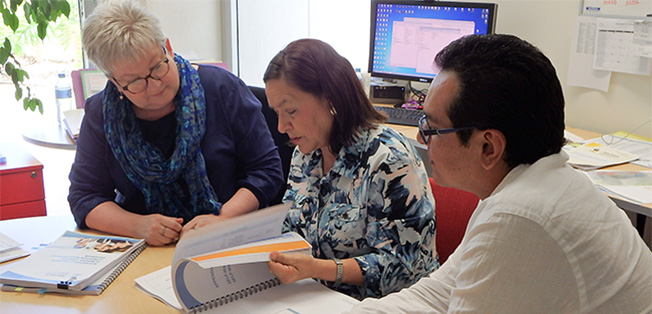
Motivational Interviewing
There has been lots of demand related to Motivational Interviewing (MI) across a number of different professions and services. In response to increasing demand, we have updated our previous Communication and Motivation workshop and are now pleased to offer the following:
How to use Motivational Interviewing skills in everyday practice: Using a blended learning approach with online pre-workshop activities and a one-day face to face workshop, participants are presented with key concepts underpinning Motivational Interviewing and practice opportunities for health coaching skills and strategies that can be used to support clients to engage in behaviour change.
Additionally FHBHRU is currently delivering a series of short Motivational Interviewing (MI) sessions for SA Health allied health professionals. A combination of individual and group activities provide interactive opportunities for participants to practice and refine motivational interviewing skills and strategies. These sessions have a focus on healthy lifestyles as a part of chronic disease prevention and management and have been very well received. We are also piloting delivery of skills-based Motivational Interviewing via group teleconference for Country Health SA staff so stayed tuned for further developments in this space!
Flinders Program online
Our online Flinders Program training courses remain popular with recent comments from participants included below:
“the Flinders model for CCM has enabled me to tie together the biopsychosocial model in a way that is patient centred and has meaning not only to the client but to me as a health professional. It has made me consider how important it is to actually sit back and listen to an individual’s health story from their perspective and not ‘preach’ to them what they must do.”
“I have also noticed that asking questions around the impact of the client’s wellbeing can unravel discussion that has possibly never taken place before.”
“Video was a good tool to demonstrate the communication between patient, doctor and allied health professionals.”
As the Flinders Program continues to evolve there has been increasing interest in implementation support for embedding the tools and processes within various settings. In response to this, we have developed two short online courses, each of approximately 45 minutes duration with additional reading and activity completion time.
The courses have been designed for the individual online learner and can supplement existing Flinders Program training (online or face to face) but have also been developed to meet the needs of a wider audience. This potential audience could include managers having oversight of the Flinders Program implementation within their service but not directly involved in using the Flinders Program tools:
- Preparing to implement the Flinders Program: This course introduces implementation science as a framework for making changes to embed the Flinders Program into practice and/or service delivery. Participants reflect on the skills needed across different levels to implement CCM as a consumer-directed, collaborative approach to care.
- Implementing the Flinders Program: This course builds from the above course and guides participants through a structured process to develop an action plan, congruent with their role, for implementation of the Flinders Program within their service.
Welcoming Elisabetta Panzirioni to the team
Elisabetta Panzirioni is our newest team member, and comes to us via Sydney from her birthplace in Rome with experience working with indigenous communities.
Welcoming international visitors and delegates from Hong Kong, Mexico and China
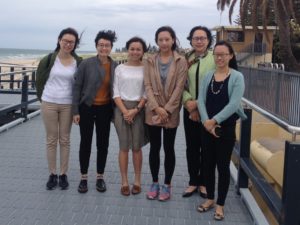
In addition to the usual Education and Training activities we have recently hosted international visitors from Hong Kong, Mexico and China
In December we welcomed a delegation from the New Life Psychiatric Rehabilitation Association in Hong Kong. The group looked at reviewing their use of, supervision within, and evaluation of low intensity psychological therapies. Several members of the group also expanded upon their previous participation in our CCM online training and undertook the Flinders Accredited Trainer workshop. Our international collaborations in December also included colleagues from the Autonomous University of Tamaulipas, Mexico. Isabel and Rodrigo undertook the Flinders Accredited Trainer workshop in preparation for a large-scale research trial involving the Flinders Program to be based in Mexico and Peru.
Chronic Condition Management (CCM) Postgraduate Programs
Chronic Condition Management has become relevant to all practice and service settings. The course topics cater to both individual areas of interest and/or your role in health care, along with providing learning in a diverse range of chronic conditions and their management, rather than being targeted to specific conditions.
We offer:
- Graduate Certificate in Chronic Condition Management
- Graduate Diploma in Chronic Condition Management
- Master of Public Health (Chronic Conditions Management Stream)
For further information on the programs please visit http://www.flinders.edu.au/medicine/sites/fhbhru/education/pg_ccm.cfm or contact Cheryl Bedford via email cheryl.bedford@flinders.edu.au or telephone 61 8 8404 2318.
Workshops for 2017
August 2 Behavioural Activation Workshop
August 7-11 CBT for Psychological Disorders
August 17-18 Building Resilience with Young People
August 21-22 Flinders Chronic Condition Management (CCM) Program
August 28-31 Advanced CBT
October 11-12 Flinders Accredited Trainer Program
October 18 How to use Motivational interviewing Skills in Everyday Practice
Connecting Flinders Trainers
Would you like to connect with others in your region using the Flinders program?
The Flinders Program is now being implemented widely both nationally and internationally, there is a possibility that there are practitioners who are licensed to use the program working in your area or there may be a Flinders Trainer in your region.
Flinders Education and Training team have requests to connect people using the Flinders program. If you would like to become a local connection let the Flinders Education and Training team know so that we can put others in touch with you. If you would like to connect with a local trainer you can also contact us for more information.
If you visit the website you will see a list of organisations who have trained staff in the Flinders program, would you like your organisation listed as well? Please email us, ccm@flinders.edu.au and let us know.
Flinders Program Accredited Trainers Biannual Forum 2017
The biannual forum for Accredited Trainers will be held at Flinders University, Bedford Park, on Thursday 16th November 2017. All welcome.
For more information please call 08 8404 2607 or email, ccm@flinders.edu.au .
Andrea Morello
Education & Training Manager
Congratulations Professor Sharon Lawn – 2016 SA Community Achievement Awards
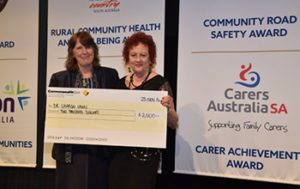
The South Australian Community Achievement Awards are designed to encourage, acknowledge and reward the valuable contributions individuals, communities and businesses make throughout South Australia. Professor Sharon Lawn has been announced as the winner of the “Carers SA Carer Achievement Award” which recognises a South Australian family carer who has not only provided substantial long term care but who has also worked to improve the recognition, services and supports for other carers. Carers SA presents this award to celebrate this individual achievement in championing the carer cause to improve the lives of family carers in South Australia.
Helping West Java improve its mental health services
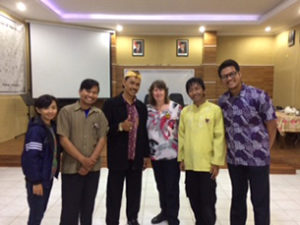
Progressive approaches to delivering care to people with mental health issues, led by Flinders University, are helping mental health leaders in Bandung, West Java to transform services delivered at their major psychiatric hospital, and in their community.
In April 2016, I delivered a training program for an official West Java Psychiatric Hospital (WJPH) delegation that included workshops with guest speakers from across the community mental health sector, and site visits to enable them to see community mental health rehabilitation and recovery-focused care firsthand.
West Java is Indonesia’s most populous province, with the highest prevalence of mental health issues among its population. It also continues to experience high rates of Pasung (use of physical restraint within the home in the absence of more effective responses to acute needs). Quality of care for people with mental illness is a human rights issue in both Australia and Indonesia; there is much that we can learn from each other. The hospital is owned by the West Java Provincial Government with the entire regional budget for mental health in the province allocated to WJPH. It has a 235 bed capacity for inpatients with approximately 482 employees, and serves a population of 45 million.
Flinders’ customised training program matched the West Java Government’s need to transform its mental health services from hospital-based mental health services to community-based mental health services, by using a recovery model. Led by the hospital’s Vice-Director, Dr Riza Putra, the workshops involved nine WJPH delegates with diverse professional backgrounds – psychiatrists, mental health nurses, a human resource manager and a researcher. Dr Emi Patmisari, a Flinders alumnus and employee of the West Java Provincial Government co-ordinated the program and the visit.
There is an enormous opportunity for this team from West Java to learn from the challenges the Australian mental system has made and progress with their goal to establish a solid recovery-focused community mental health approach.
This successful visit was followed up with a trip to West Java in November 2016 by myself and Ms Deb O’Kane from Flinders’ School of Nursing and Midwifery. Our aim was to collaborate and provide further training to the WJPH staff and key community mental health stakeholders. A highlight of our trip was being treated to an afternoon of listening to local children performing traditional and modern music (Bohemian Rhapsody) on their nationally revered instrument – Angklung, and being part of a large city steeped in culture…and all that traffic!
I’m working closely with colleagues Professor Muir-Cochrane and Ms Deb O’Kane, whose international expertise in mental health education and seclusion and restraint research is helping WJPH staff to reduce the use of Pasung in West Java.
Professor Sharon Lawn
Director
Mental health research receives rave reviews
A recent paper led by Professor Sharon Lawn has been gaining some very positive attention within the international mental health research community. It is drawn from research that used Discourse Analysis to understand the experience of Community Treatment Orders (CTOs) for people with mental illness who are subject to this legally imposed treatment, and the experience for mental health professionals who are charged with enacting CTOs. It’s an area with inherent complexity that involves balancing perceived coercion with meaningful engagement and care. Our unique paper highlighted the important role of metaphors that became apparent while analysing the data and how they offer a real opportunity for mental health workers to overcome the barriers to engagement that often get in the way of providing person-centre care for these patients.
Every now and then, as a researcher, you do research that you feel is quite special and that you are really proud of because it aims to say something new and different and which you sense can therefore have a real impact in a sea of general and more safe research. This is one paper that fits that bill.
Lawn, S., Delany, T., Pulvirenti, M., McMillan, J. (2016) Examining the use of metaphors to understand the experience of community treatment orders for patients and mental health workers. BMC Psychiatry, 16(1), 1-16, doi 10.1186/s12888-016-0791-z
And a further paper from that research which is also unique is – Lawn, S., Delaney, T., Pulvirenti, M., McMillan, J. (2015) A qualitative study using moral framing to understand patients’ and mental health workers’ experiences of community treatment orders. BMC Psychiatry, 15, 274-290, doi 10.1186/s12888-015-0653-0
Both papers are available as open access.
https://bmcpsychiatry.biomedcentral.com/articles/10.1186/s12888-016-0791-z
https://bmcpsychiatry.biomedcentral.com/articles/10.1186/s12888-015-0653-0
Are you interested in becoming a volunteer?
Do you have an ongoing health condition? (such as Diabetes, Arthritis, Asthma, Auto-immune Disease, Heart Disease, Lung Disease, Parkinson’s, Cystic Fibrosis, Cancer, Pain or loss of mobility)
Do you have two hours to spare?
As a volunteer at one of our workshops, you will be interviewed by Flinders University student/s or health professional/s who works with people with ongoing health conditions.
Volunteers often give feedback about how they have enjoyed this experience and have often learnt something new about their health. For the workshop participants, working with the volunteer is a highlight of their training.
Refreshments will be provided.
Please contact the CCM team at Flinders University on (08) 8404 2607 or ccm@flinders.edu.au.
Congratulations
Each year, BMC-Section Editors and Editors are nominated by BioMed Central staff to receive an award to acknowledge their work and achievements through the year. In 2016, our very own Professor Sharon Lawn was announced as the Section Editor of the Year. Congratulations Sharon.
We are pleased to congratulate Simone Orlowski who has accepted an offer to work as a Research Fellow at Connected Health Innovation in Boston, MA, USA (affiliated with Massachusetts General Hospital and Harvard Medical School). Simone recently completed her PhD, so she’s now in her new position in the USA. Her position is in the User Centered Design team, working to create and evaluate new health care technologies and interventions. We wish you all the best Simone.


